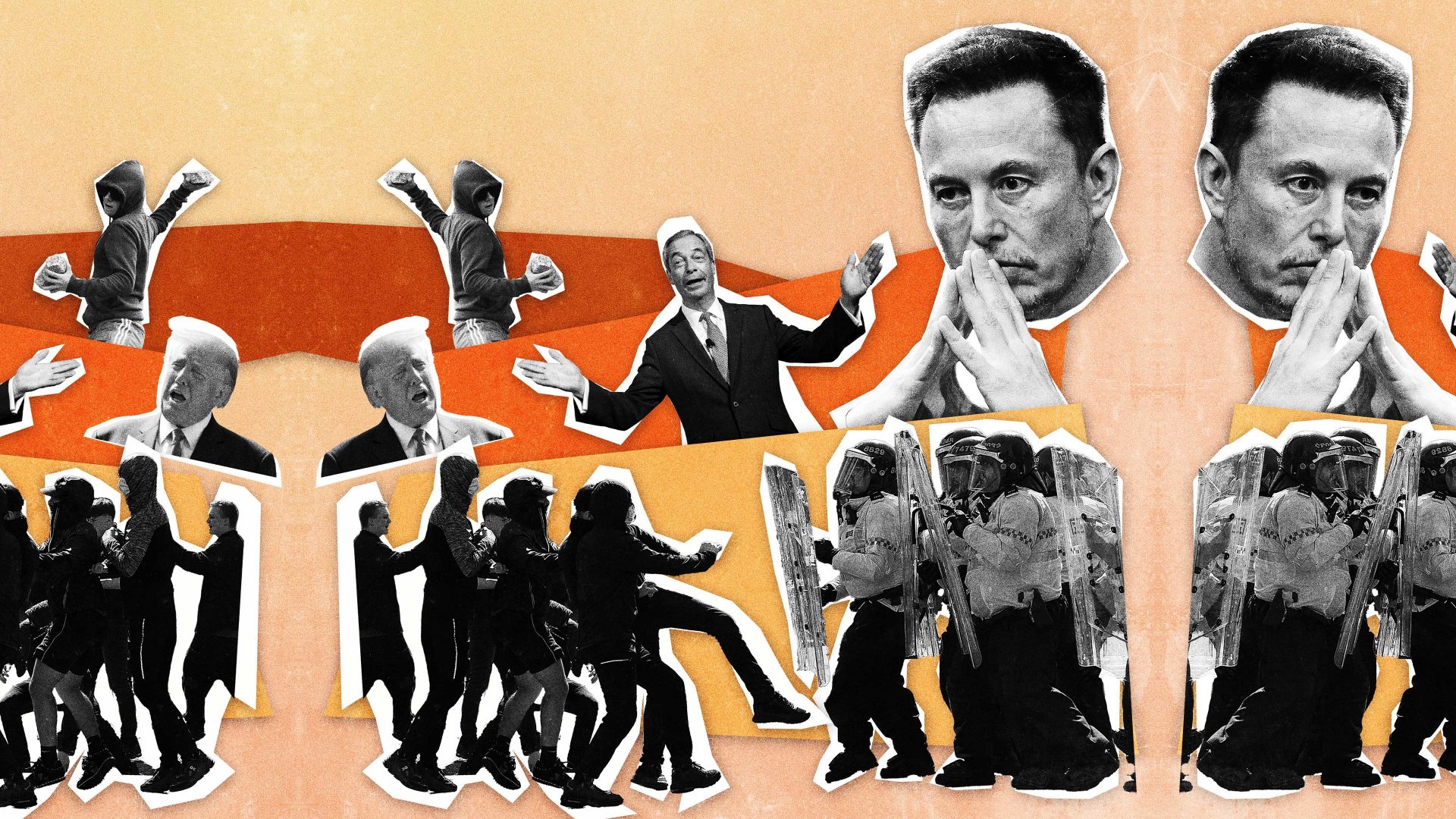The story of this year has so nearly been that the populist right was in the ascendancy across the western world.
At different points in the year so far, Donald Trump has looked almost certain to win back the White House. Marine Le Pen’s National Rally appeared set to join the government of France. The populist right would make sweeping gains in the European Parliamentary elections. And Nigel Farage and Reform might overtake the Conservative Party into second place in the UK’s general election.
As it stands, the movement – such as it is – has not just fallen short of each of those goals, it has humiliated itself in the process. Trump is scrambling to handle Kamala Harris, and proving utterly unable to respond to the attack line that he and his campaign are just plain “weird”.
National Rally had no response to being beaten into third place in the French Assembly elections. In the European Parliament, the reality quickly set in that the European People’s Party was still firmly in control, and Ursula von der Leyen would easily get her second term. And in the UK, Nigel Farage – fresh from only securing five seats in parliament – made the bizarre decision to yoke his cause to violent unrest on the streets of Britain.
The threat of the populist right, and the far right fringe that goes alongside it, has not retreated. But many of its most enthusiastic boosters have fallen flat on their face in what could have been their time of triumph.
The circumstances differ from country to country, but the underlying causes are the same: the fringe right have confused the internet with real life, and haven’t noticed that the people they spend all their time with don’t represent the public at large. In other words, they’ve got weird.
There is one almost universal flex that people outside of the mainstream right like to do, whether they’re Donald Trump, Nigel Farage, Elon Musk, Douglas Murray, Matt Goodwin, or any one of the other largely generic middle-aged men who tend to be the figureheads or cheerleaders of these movements – and that’s to claim that the words “far right”, “fringe right” or “populist right” have no meaning, and are just insults thrown by a panicked left.
Let us be honest, this is exactly the sort of newspaper people in that group are referring to when they make such accusations – almost everyone who reads this paper voted Remain, most would quite like to rejoin the EU, and most would define themselves as left-of-centre and socially liberal.
And yet few of us struggle to see the difference between the mainstream political right and its fringes. It is not far right to want to cut taxes rather than raise public spending, or to believe privatisation is generally better than state provision.
It’s not far right to be concerned about the level of immigration in the UK, even if we don’t share those concerns. Similarly, while we may vehemently disagree with some of these views, it is not far right or extremist to believe marriage should be restricted to heterosexual couples, or that integration is a better approach than multiculturalism, or that having children should be encouraged financially by the state. Liberals oppose social conservatives, but don’t need to confuse that with an illegitimate political viewpoint.
Those who have hurled themselves towards the political fringes like to list themselves as holders of some of the beliefs above and then decry the crazy liberals who have called them far right “just for believing those things”, usually adding that it’s what most people believe.
In reality, these people have taken themselves well beyond such territory. Populism refers to a specific branch of politics – which can arise on the left or the right – which promises easy solutions to hard problems.
Populism will generally suggest that it would be easily possible to radically increase public spending, cut taxes, or both. It will suggest long-running problems can easily be fixed. To explain why it has not happened yet, it generally needs to pick a villain.
That is often “corporations” or “lobbyists” for the left, or it is “globalism”, “woke elites” or the like for the right. Reform UK’s manifesto pledged £80bn a year in tax cuts: it could hardly be more nakedly populist than that.
Pushing towards the fringes of the right, or fully into the far right is slightly different. It relies on suggesting that there are intrinsic and insoluble clashes between different ethnic groups in the country – often the belief that there is a fundamental incompatibility between Islam and “western values”.
This narrative is generally fuelled by suggestions that the authorities have been captured by people unwilling to acknowledge this irreconcilable conflict – suggesting a collusion between government, police and media to cover up “the truth”. This manifests in the idea that asylum seekers secretly get council housing, that murders or rapes by non-whites are not prosecuted or reported, and the like.
These are powerful tropes with a long history steeped in political violence and unrest. Those who indulge in them are going beyond democratic norms, trying to appeal to the guttural spirit of the mob.
Nigel Farage and those of his ilk had stopped short of this line in most of their rhetoric – until the tragic murder of three young girls in an unfathomable attack in Southport in the last days of July. Before the community had any chance to absorb what had happened, someone on the internet – we do not yet know who, and there is an ongoing criminal investigation on the matter – invented the entirely false statement that the perpetrator was a Muslim asylum seeker.
As that false information circulated, supposedly respectable commentators like Farage and the barrister Steven Barrett suggested that there were things the public was not being told about the attack, that the narrative was being managed, and that this risked fuelling public anger. It is impossible to see how these remarks could have been intended any way other than to pour petrol on to the flames.
The result was that when violent thugs caused havoc across the country based on nothing but what appeared to be disinformation spread with racist intent, figures on the UK right felt a need to associate themselves with it or even defend it. This spectacularly misjudged the public mood.
The British public hate overt racism, and most pride themselves on the country’s diversity. More than anything, though, the British public hates public disorder on the streets. The commentators badly misjudged their voters: British small-c conservatives think “good” when they see someone locked up for inciting riots.
The men who make their living off calling everyone else in politics “out of touch” associated their cause with dumb and racist thuggery, and were shocked when that didn’t go well for them. They have spent so much time in their bubble they have forgotten what things look like from the outside. Therefore, is must have come as a surprise last week when a poll showed that 51% of voters thought Farage bore responsiblity for the riots.
The poison is currently coursing through the veins of the US Republican movement, too. Most Americans don’t want to hear endless conspiracy theories about hacked election machinery. They don’t want national abortion bans, or sweeping plans to overhaul the federal government. They don’t want attacks on childless couples. They’re pretty sick of hearing weird claims about foreign governments emptying out prisons and “asylums”.
Lots of Americans think Donald Trump was pretty good for the American economy and might have voted for him on that basis – but now Biden has gone, they’ve noticed he’s got… weird.
It is not hard to see how this happened to the American right. They built their own swamp in which to fester. Fox News started as an antidote to a perceived bias in US cable news, but it became an ecosystem all to itself, one which talking heads and politicians alike never needed to leave. You could watch Fox News, be on Fox News, and tailor your news for Fox News.
Eventually, though, even Fox News on its own felt too moderate. It became the “acceptable”, “mainstream” outlet, while the real action moved to One America News Network and NewsMax, and a whole network of podcasts and streams even more extreme than those.
Once, a right wing politician would relax and say what they really thought on Fox News, and button themselves down and adopt some discipline for appearances on CNN, NBC, or similar. Now, Fox News is the toned-down version, with the podcasts getting the full-throated insanity. They gave up on the other channels long ago.
The US was ahead, but the UK right wing media ecosystem is rapidly catching up – with its own channels, its own fringe podcasts and outlets, and the same habit of churning themselves up in their self-contained ecosystem.
In trying to make a support network in the media, they have created a tool of radicalisation. Never having to test their ideas more widely, never having to actually contact the public, handling every detail of the news so it looks as they wish – right down to their own comforting, custom polling – they have become detached from reality.
The world’s right wing agitators have been on a journey together, lurching ever-further rightwards, without stopping to look back even for a moment. It is only when they’re forced to make contact with reality that they realise no one’s been following them.




